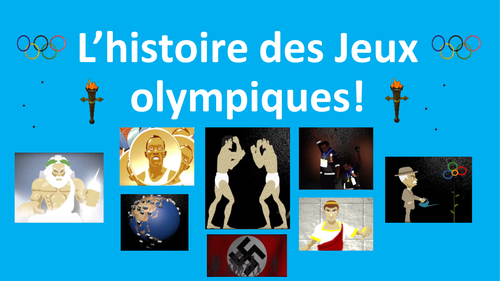

I found a great short film (2 mins 20 secs) on YouTube about the history of the Olympic Games, I love the stylised presentation and have created a series of exercises which I hope will make the French commentary accessible to the students. There is a step-by-step PowerPoint to accompany the worksheet (the answers are both on the PowerPoint and on the worksheet).
Slide 2: states the lesson objectives:
Objectif: To develop your listening skills and to learn facts and vocabulary related to the history of the Olympic Games. This is differentiated into all, most and some.
The first worksheet has 3 goals:
All: Match the names and the pictures.
Most: AND Put the countries in the order that they appear/ are mentioned.
Some: AND Match the date to the correct person.
To prepare for these tasks the students are told to:
All: Discuss how you would pronounce the names with a French accent!
Most: AND be able to translate all the countries.
Some: AND be able to say all the years in French.
Names include:
Pierre de Coubertin, Jesse Owens, le dieu grec Zeus, Tommie Smith
Countries include:
Le Brésil (Rio de Janeiro), La France (Paris), La Grèce (le temple de Zeus),
Dates include :
1894, 8ième siècle avant Jésus Christ, 1968
Slide 4 says:
Now you will listen to and watch the short film. Remember, you are only picking out key information. Don’t worry if you don’t understand all the French you hear! Also use the images you see, your logic and previous knowledge to help.
You will listen and watch twice, maybe more if your teacher agrees!
Slides 5, 6 and 7 have the answers.
Slide 8 gives instructions to prepare the students for the next listening task. First is to complete Exercise B which is an English to French match up of vocabulary and phrases that the students will need to in order to understand and answer the multiple choice questions.
French vocabulary/ phrases include:
1. Les Jeux olympiques antiques.
2. Le pancrace, la course, le tir.
3. Les tremblements de terre et les inondations.
4. Les femmes.
Slide 9 repeats the advice on Slide 4.
There are 11 multiple choice questions.
Examples of questions:
1. Les Jeux olympiques antiques ont été organisés en l’honneur…
A. de Pierre de Coubertin.
B. du dieu grec Zeus.
C. de l’Empereur Théodose 1er.
2. Parmi les sports aux Jeux olympiques antiques ont été….
A. Le pancrace, la course et la boxe.
B. Le pancrace, le tennis et la natation.
C. Le pancrace, l’équitation et le tir.
Slides 10, 11 and 12 have the answers and finally slide 13 provides the opportunity for reflection.
Slide 2: states the lesson objectives:
Objectif: To develop your listening skills and to learn facts and vocabulary related to the history of the Olympic Games. This is differentiated into all, most and some.
The first worksheet has 3 goals:
All: Match the names and the pictures.
Most: AND Put the countries in the order that they appear/ are mentioned.
Some: AND Match the date to the correct person.
To prepare for these tasks the students are told to:
All: Discuss how you would pronounce the names with a French accent!
Most: AND be able to translate all the countries.
Some: AND be able to say all the years in French.
Names include:
Pierre de Coubertin, Jesse Owens, le dieu grec Zeus, Tommie Smith
Countries include:
Le Brésil (Rio de Janeiro), La France (Paris), La Grèce (le temple de Zeus),
Dates include :
1894, 8ième siècle avant Jésus Christ, 1968
Slide 4 says:
Now you will listen to and watch the short film. Remember, you are only picking out key information. Don’t worry if you don’t understand all the French you hear! Also use the images you see, your logic and previous knowledge to help.
You will listen and watch twice, maybe more if your teacher agrees!
Slides 5, 6 and 7 have the answers.
Slide 8 gives instructions to prepare the students for the next listening task. First is to complete Exercise B which is an English to French match up of vocabulary and phrases that the students will need to in order to understand and answer the multiple choice questions.
French vocabulary/ phrases include:
1. Les Jeux olympiques antiques.
2. Le pancrace, la course, le tir.
3. Les tremblements de terre et les inondations.
4. Les femmes.
Slide 9 repeats the advice on Slide 4.
There are 11 multiple choice questions.
Examples of questions:
1. Les Jeux olympiques antiques ont été organisés en l’honneur…
A. de Pierre de Coubertin.
B. du dieu grec Zeus.
C. de l’Empereur Théodose 1er.
2. Parmi les sports aux Jeux olympiques antiques ont été….
A. Le pancrace, la course et la boxe.
B. Le pancrace, le tennis et la natation.
C. Le pancrace, l’équitation et le tir.
Slides 10, 11 and 12 have the answers and finally slide 13 provides the opportunity for reflection.
Something went wrong, please try again later.
This resource hasn't been reviewed yet
To ensure quality for our reviews, only customers who have purchased this resource can review it
Report this resourceto let us know if it violates our terms and conditions.
Our customer service team will review your report and will be in touch.
£3.50
